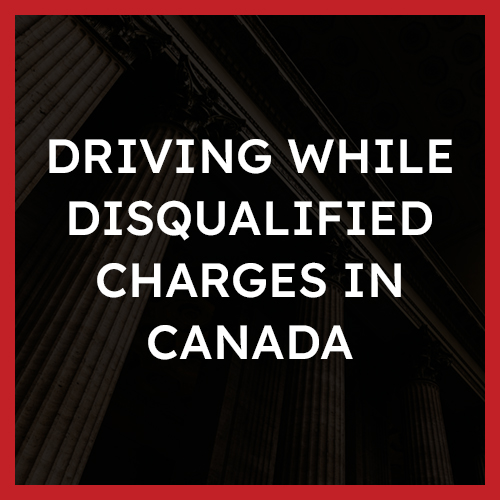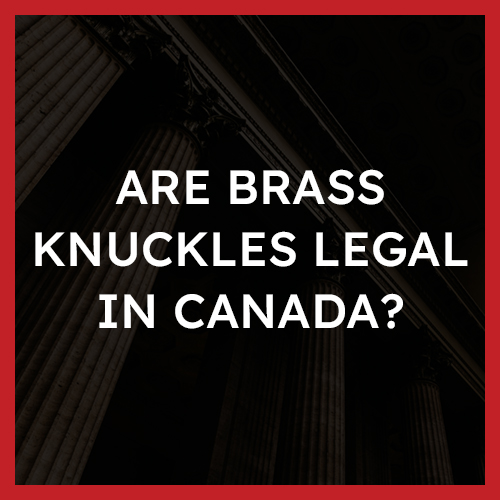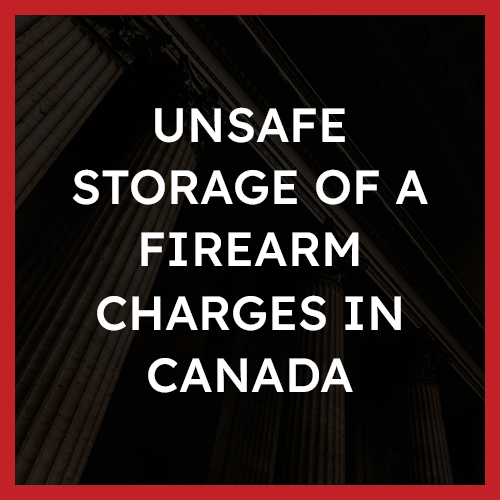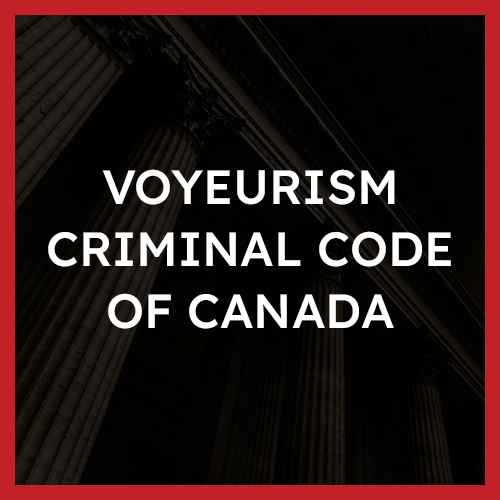Driving While Disqualified (s. 259) Laws in Canada
What is driving while disqualified?

As the name suggests, driving while disqualified is defined as operating a motor vehicle, vessel, or aircraft while there is a court order prohibiting you from doing so. These court orders can be for a range of reasons (see FAQ), but usually, you would be provided with a copy of it at the time you receive it. Even if a past driving prohibition is expired, you may still need to take steps to reinstate your license before getting back on the road.
Driving while disqualified is a serious offence in Canada, classified as a ‘hybrid’ offence. This means that the Crown can choose how to proceed either ‘summarily’ (less serious) or by ‘indictment’ (more serious) depending on the circumstances and facts of any particular case. Because you are ignoring a court order (the driving prohibition) when you commit this offence, the courts take it very seriously.
Examples
Some common examples of driving while disqualified may include the following:
- Your spouse had some car troubles and you had to go pick them up from work, despite knowing your license has been suspended
- You were convicted of driving impaired a few months ago (your license is suspended) but you decided to go to the store anyways, as it was only a quick trip
- You were released on bail for a dangerous driving charge, and you drove knowing that one of your bail conditions is not to drive
Defences
While each driving while disqualified charge is different, there are several defences available to an accused, including:
- Charter arguments
- Defence of necessity
- Not aware of driving prohibition
- Identity
Punishment
As stated above, when faced with a driving while disqualified charge, the Crown can proceed either by indictment or summarily.
If the Crown elects to proceed by indictment, the maximum sentence you could face if convicted is five years in prison. On the other hand, if convicted summarily, you could face up to two years in prison, less a day. You could also face large fines and would be prohibited from driving for at least one year (potentially more if this is not your first conviction). Punishments can and will range depending on the circumstances of the offence.
Overview of the Offence
The Criminal Code outlines the driving while disqualified offence at s. 259:
Operation while disqualified
(4) Every offender who operates a motor vehicle, vessel or aircraft or any railway equipment in Canada while disqualified from doing so, other than an offender who is registered in an alcohol ignition interlock device program established under the law of the province in which the offender resides and who complies with the conditions of the program,
(a) is guilty of an indictable offence and liable to imprisonment for a term not exceeding five years; or
(b) is guilty of an offence punishable on summary conviction.
(5) For the purposes of this section, disqualification means
(a) a prohibition from operating a motor vehicle, vessel or aircraft or any railway equipment ordered under any of subsections (1), (1.01), (2) and (3.1) to (3.4); or
(b) in respect of a conviction or discharge under section 730 of any offence referred to in any of subsections (1), (1.01), (2) and (3.1) to (3.4), a disqualification or any other form of legal restriction of the right or privilege to operate a motor vehicle, vessel or aircraft imposed
(i) in the case of a motor vehicle, under the law of a province, and
(ii) in the case of a vessel or an aircraft, under an Act of Parliament.
Notably, the offence creates an exception for someone who is enrolled in an alcohol ignition interlock program. Enrolling is key, however. Merely being eligible for the program is not enough to meet this barrier, you must be actively enrolled.
Again, the Crown can proceed either summarily or by indictment. This will depend on the seriousness of your case, and your personal circumstances.
Driving While Disqualified Defences
In any criminal proceedings, the burden falls on the Crown to prove you’re guilty. The Crown needs to establish the essential elements of the offence, and additionally, address any defences raised by you or your defence lawyer. Based on the specific facts of your case, your defence lawyer will be able to identify elements/defences that are the strongest arguments to make.
Elements of Offence
The Crown needs to prove several elements in order for someone to be convicted of driving while disqualified, including:
- You were the person driving the vehicle (identity)
- You did indeed operate a vehicle
- The vehicle was operated in a public place
- Your license was suspended at the time by a court order
- You were given a copy of the court order
- The court order was read to you
- You were not enrolled in an ignition interlock program at the time of the arrest
Generally, there are only a few defences available for a charge of driving while disqualified.
Charter Arguments
The first is a standard Charter argument, where a defence lawyer might be able to have certain evidence that was gathered against you excluded if the police violated certain Charter rights. If something felt off when the police pulled you over and arrested you, you should contact an experienced criminal defence lawyer immediately.
Defence of Necessity
Another defence that can be used against a charge of driving while disqualified is the defence of necessity. The defence of necessity applies where an accused was forced into an action that broke the law in order to avoid greater harm. This greater harm usually has to be imminent danger that threatens one’s life. It is important to note that this defence is accepted by the courts only in the rarest of circumstances. In order to use it for a charge of driving while disqualified, you would also need to argue that you drove only as long as was necessary to escape that danger and that there was no other legal alternative in the circumstances.
Not Aware of Driving Prohibition
In order to be found guilty of driving while disqualified, the Crown needs to prove beyond a reasonable doubt that you were aware of the driving prohibition (see elements of offence). This usually includes proving that there was a prohibition read in court on the record, that a copy of the prohibition order was provided to the offender, and that a copy of the order was read to the offender. Thus, if you were unaware that you were prohibited from driving, you can rely on that as a defence to this offence. See the Supreme Court’s decision in R v Lariviere below for more information.
Identity
Remember, the Crown must also prove identity beyond a reasonable doubt. Depending on the circumstances of the charge, you could try and argue that the police were not able to positively identify the suspect as you. This is usually most effective when the police only get a fleeting glimpse of the driver of the vehicle and stop them later. Again, this defence is highly dependent on the circumstances, and it may not be available/reasonable all of the time.
Driving While Disqualified Punishment
Driving while disqualified is a ‘hybrid’ offence in Canada, meaning the Crown prosecutor has some flexibility in determining how seriously the offence will be treated. The Crown can elect (or choose) whether they proceed summarily (generally less serious) or by indictment (generally more serious).
If the Crown proceeds summarily, the maximum punishment that can be given upon a finding of guilt is two years in prison, less a day.
By contrast, if the Crown proceeds by indictment, the maximum penalty is five years in prison upon a finding of guilt.
No matter how the Crown proceeds, you could also face the following additional consequences upon conviction:
- Additional driving prohibitions (at least one year if it is your first offence)
- Fines up to $5000
- Criminal record (which can impact your ability to find employment, travel outside of Canada, gain citizenship, etc.)
Punishments range based on the circumstances of the offence. You should speak to an experienced criminal defence lawyer about your specific situation, and they will be able to offer more personalized insight as to what sort of consequences you might face upon conviction.
Frequently Asked Questions
Is driving while disqualified a criminal offence?
Yes, driving while disqualified is a criminal offence in Canada. If found guilty, you could face serious consequences. The Crown has to prove a number of things in order to be found guilty (see elements of offence).
What happens if you get caught driving while disqualified in Canada?
Driving while disqualified in Canada is a very serious crime. You could face potential jail time, further driving prohibition, a criminal record, fines, or other serious outcomes. If you have been charged with driving while disqualified, you should contact an experienced criminal defence lawyer immediately. You can book a free consultation with Strategic Criminal Defence online or over the phone.
What are license suspensions?
A license suspension is an order, from the courts as a result of a criminal offence or from violating certain provincial traffic offences. They can be imposed in a variety of circumstances and can be for varying periods of time. Usually, if you have your license suspended, you are given a copy of the order stating so. This might be a court order, a bail release, or a notice given by a police officer.
If you believe you might have a suspended license, you should contact a criminal defence lawyer for more information.
Why do drivers get disqualified?
Drivers can get disqualified for a variety of reasons. Usually, a driving disqualification will come in the form of a court order. Many criminal driving offences in Canada allow for judges to impose a driving prohibition on the offender. These can range from impaired driving (so long as that person is not enrolled in an ignition interlock program, see above) to dangerous driving or flight from police in some circumstances. Some offences, such as impaired driving, carry with them a mandatory driving prohibition, where the judge has no choice but to impose a driving prohibition. It is also in the judge’s discretion to impose a driving prohibition for other offences where such a prohibition is not mandatory. Judges can also hand out driving prohibitions as part of release/bail conditions. This is usually done where the alleged offence is a driving offence.
Certain provincial offences, such as those under Alberta’s Traffic Safety Act, can also impose driving prohibitions. These provincial bans still count as being disqualified for the purposes of s. 259.
Published Decisions
R v Lariviere, 2001 SCC 93
In this case, the Supreme Court was reviewing a decision by the Quebec Court of Appeal, where the court set aside a conviction for a man found guilty of driving while disqualified. When the case was initially at trial, the trial judge found that
This decision is important for a few reasons. First, it demonstrates what was explained above; the Crown must prove that you were prohibited from driving at the time of the offence and that you were aware of that decision. However, the trial judge’s comments about believing the accused are also important. Despite believing Mr. Lariviere when he stated that he was unaware of the driving prohibition, the trial judge still convicted him. This is what led the Quebec Court of Appeal to set aside his conviction. Remember: in order to be found guilty, the Crown needs to prove the elements of the offence beyond a reasonable doubt. This means that the burden is on the Crown to prove that you are guilty. There is no burden on you to prove that you are innocent.
You can read the full case here.
R v Bighead, 2013 SKCA 63
In this Saskatchewan decision, Mr. Bighead was convicted of driving while disqualified. He was given a fine of $750 but was not given the mandatory driving prohibition that he should have. Mr. Bighead had four prior convictions for driving while disqualified, as well as prior convictions for impaired driving. At trial, Mr. Bighead informed the court that his reason for driving while disqualified was because his spouse had something come up and that he, therefore, had to drive himself home. The Crown appealed this case in order to have the court grant the mandatory driving prohibition. Ultimately, the court decided to change his fine to 60 days in prison and to grant the mandatory driving prohibition for one year.
Though he represented himself, Mr. Bighead also indirectly attempted to raise the defence of necessity, described above. The court noted that it had the ‘flavour of necessity’ but did not accept the defence. As mentioned above, the accused would need to show that there was some danger or peril and that there was no legal alternative. Neither of these barriers were met by Mr. Bighead in this case.
This case is important because the court gave detailed reasons as to why it was imposing the punishment it did. Because Mr. Bighead had a number of prior convictions for driving-related offences and demonstrated repeatedly that he was willing to drive while disqualified, the court felt that incarceration was appropriate. As stated above, when a driver shows their willingness to ignore driving prohibitions, the courts look to use prison as a deterrent. However, the court also considered Mr. Bighead’s mitigating factors, namely that he committed the offence while working in order to provide for his family. This is why the court decided that a short incarceration period of 60 days was appropriate.
You can view the full case here.
R v Ali, 2019 ONCJ 593
In this Ontario case, Mr. Ali was pulled over for a routine traffic stop and was subsequently charged with driving while disqualified. He was unable to provide the police officer who pulled him over with a driver’s licence and indeed stated that he did not have one. When the police officer ran his name in the database, she found that he was currently out on bail, with one of his conditions being that he does not occupy the driver’s seat of a vehicle or drive. He was arrested and brought back to the police station, where he was held pending a bail hearing.
At trial, Mr. Ali tried to make a Charter argument to have the evidence from the traffic stop excluded. He argued that he was unreasonably detained when he was pulled over, thereby breaching his s. 9 Charter rights. The trial judge rejected this argument, finding that the traffic stop was based on reasonable grounds of suspicion. Ultimately, Mr. Ali was convicted because this argument failed, as he was clearly found to be in breach of his bail conditions. There is nothing regarding sentencing in this written decision, but given that Mr. Ali has already breached a driving prohibition once, he may be punished more harshly because of that.
You can view the full case here.
About The Author
Ask A Question
We endeavor to respond to questions within 24 hours. If your matter is urgent, please call our office or submit a request for a free consultation.







